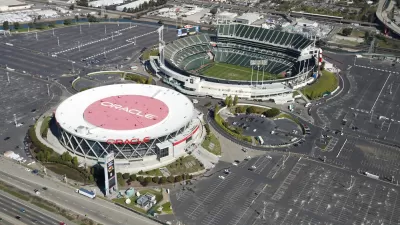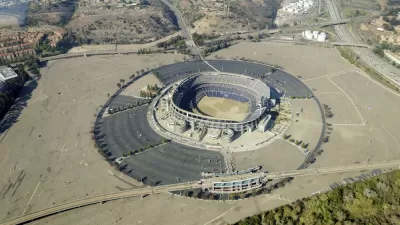Planetizen rounded up the pertinent news stories on the big move by the NFL's Raiders from their home in the East Bay to Sin City. The Las Vegas Raiders will be a thing by 2020 at the latest.

"As expected, NFL owners gave Las Vegas its blessing to host one of the league’s most storied franchises on Monday," reports Elliot Almond for The Mercury News, with proximity to the fan base that got the bad news on Monday.
Reporting for the Las Vegas Sun, Adam Candee made this pronouncement: "The Las Vegas Raiders are official."
Paul Gutierrez writes for ESPN about how the deal got made, with a 31-1 vote by NFL owners. The Miami Dolphins were the only team to vote against the move. Will Brinson and Tim Kawakami both report that Dallas Cowboy owner Jerry Jones was the not-so-invisible political and financial force behind the move.
The stadium deal that enables the move seemed dead in the water as recently as January 2017, when casino magnate Sheldon Adelson and Goldman Sachs backed out of the deal. Now, however, with a $1.9 billion stadium construction plan in place, Las Vegas is "poised to claim the mantle of World’s Most Expensive Stadium from East Rutherford, New Jersey, where the Jets and Giants play in the $1.6 billion MetLife Stadium," writes Henry Grabar for Slate. Here's the record breaking rub:
Clark County taxpayers will contribute $750 million to the new arena, a record for a sports facility—about $354 per resident, taken from an increased tax on hotel rooms. That tax currently pays for schools and transportation, in addition to tourism-related expenditures.
Back in October, Stanford economist Roger Noll went on the record in an article by Aaron Stanley calling the stadium deal "the worst deal for a city I have ever seen."
FULL STORY: BREAKING: NFL owners vote to send Raiders to Las Vegas

Alabama: Trump Terminates Settlements for Black Communities Harmed By Raw Sewage
Trump deemed the landmark civil rights agreement “illegal DEI and environmental justice policy.”

Study: Maui’s Plan to Convert Vacation Rentals to Long-Term Housing Could Cause Nearly $1 Billion Economic Loss
The plan would reduce visitor accommodation by 25% resulting in 1,900 jobs lost.

Why Should We Subsidize Public Transportation?
Many public transit agencies face financial stress due to rising costs, declining fare revenue, and declining subsidies. Transit advocates must provide a strong business case for increasing public transit funding.

Paris Bike Boom Leads to Steep Drop in Air Pollution
The French city’s air quality has improved dramatically in the past 20 years, coinciding with a growth in cycling.

Why Housing Costs More to Build in California Than in Texas
Hard costs like labor and materials combined with ‘soft’ costs such as permitting make building in the San Francisco Bay Area almost three times as costly as in Texas cities.

San Diego County Sees a Rise in Urban Coyotes
San Diego County experiences a rise in urban coyotes, as sightings become prevalent throughout its urban neighbourhoods and surrounding areas.
Urban Design for Planners 1: Software Tools
This six-course series explores essential urban design concepts using open source software and equips planners with the tools they need to participate fully in the urban design process.
Planning for Universal Design
Learn the tools for implementing Universal Design in planning regulations.
Smith Gee Studio
Alamo Area Metropolitan Planning Organization
City of Santa Clarita
Institute for Housing and Urban Development Studies (IHS)
City of Grandview
Harvard GSD Executive Education
Toledo-Lucas County Plan Commissions
Salt Lake City
NYU Wagner Graduate School of Public Service




























